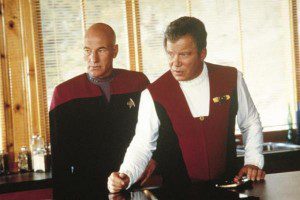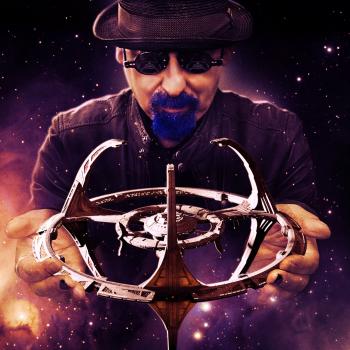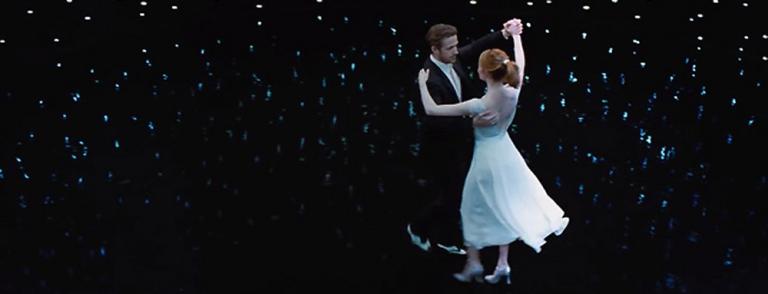 My ex-roommates and I used to have a little ritual. Every Sunday night, we would gather around a TV set with as many friends as possible to watch the latest episode of Star Trek: The Next Generation and, time permitting, Deep Space Nine. The liturgy of our humble adoration was punctuated by commercial breaks that enabled us to dissect each act of each teleplay with the loving care that one normally reserves for picking at watermelon seeds. Critical ejaculations — “Book reference!” here, “Run another diagnostic!” there — were permitted like so many amens, so long as these outbursts did not snowball into fully-scripted distractions from the pageantry before us.
My ex-roommates and I used to have a little ritual. Every Sunday night, we would gather around a TV set with as many friends as possible to watch the latest episode of Star Trek: The Next Generation and, time permitting, Deep Space Nine. The liturgy of our humble adoration was punctuated by commercial breaks that enabled us to dissect each act of each teleplay with the loving care that one normally reserves for picking at watermelon seeds. Critical ejaculations — “Book reference!” here, “Run another diagnostic!” there — were permitted like so many amens, so long as these outbursts did not snowball into fully-scripted distractions from the pageantry before us.
But lately there were grumblings. The ritual had grown stale, boring, and the post mortem on each episode seemed to expose a malignant complacency.
The Next Generation’s inability to think up exciting climaxes; the frequency with which the Enterprise was blown up in countless alternate timelines; the way they always built up great cliffhangers only to piss the dramatic tension away in part two; these tumors ate away at our devotion to the show. These doubts were exacerbated by the fundamentalist Trekkers among us who not only watched every episode, but enjoyed them too.
I am thus greatly relieved to tell my fellow backslidden Trekkers that Star Trek: Generations is everything the TV show should have been, plus a little extra. At first it starts like your average episode: after a perfunctory prologue set in Captain Kirk’s day (more on that later), the NextGen storyline begins without any setup as though we should know exactly who each person is and what they have been up to lately. As, however, the story progresses, it becomes clear that this is a story that will take risks. Data finally installs his emotion chip and becomes a whining, punning pain in the butt (hopefully this is the last time we’ll see his use of emotions treated like such a novelty). Things will happen that can never be reversed. This is how the series finale should have been.
The story, if you must know, involves an energy ribbon that moonlights as a doorway to the Nexus, the latest in a series of paradises designed to lure our captains away for some serious navel-gazing (a pastime that seems to be getting easier for Kirk with each passing film). How exactly one leaves the Nexus is never explained, but between the above-average script and performances that, for the most part, rise above the call of duty, you tend to forget that the Nexus in all its simple-minded expediency makes Stargate’s central plot device look like the work of a great deal of deep and complex thought.
The plot is propelled by one Dr Soran (Malcolm McDowell looking vaguely like a geriatric Billy Idol), who was somehow yanked out of the Nexus back in Kirk’s day and is now blowing planets up in an attempt to get back in. As Soran, McDowell packs a green-glowing gun and whacks a number of people on the head. It’s a restrained role for McDowell, but I couldn’t help thinking that something of his Caligularian influence had seeped into the other actors’ performances: when Kirk opens the door to his bedroom, we hear a horse neighing from inside.
The one major drawback to this film is its summary dismissal of Captain Kirk (William Shatner) from the Star Trek universe. It’s never been a secret that Kirk will die in this film — Shatner was hawking a memoir on the topic weeks before the film opened — but his death doesn’t have the thematic significance to this film that Spock’s had (a whole 12 years ago!) to Star Trek II: The Wrath of Khan. Instead, Kirk becomes the latest in a series of NextGen expendable crewmembers. The torch that is supposedly being passed between generations here is little more than a fizzled matchstick.
On the other hand, the Next Generation cast would seem to be well on their way to a successful ensemble movie career. My only regret is that the intimacy of my roommates’ weekly votive offerings has been replaced with bi-annual trips to the cinematic temple, a sanctuary that I must share with complete and total strangers. The detached solemnity of the theatre prohibits me from shouting “Hey, that Klingon has red blood!” until Generations is released on video. But if future Trek movies are as good as this one, without the half-hearted pretense of appealing to the original series’ fans, they will be worth the wait.
— A version of this review was first published in The Campus Times.












